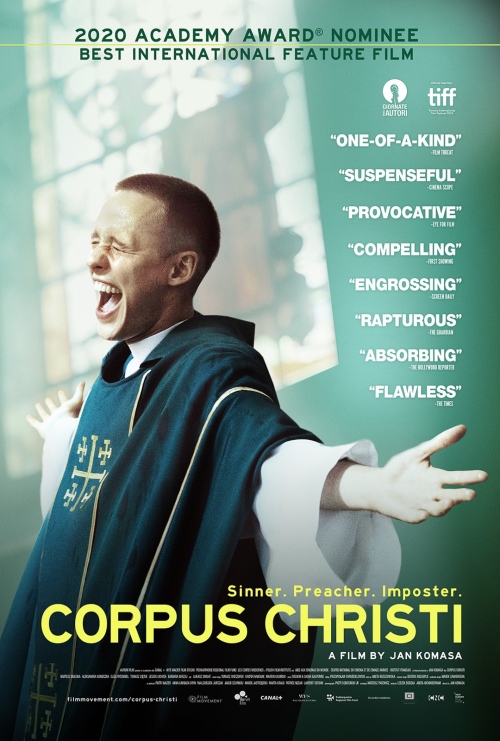Antonio Banderas landed one of the five nominations for Best Actor this year for his role as Salvador in Pain and Glory (Dolor y Gloria), the latest film from Spanish filmmaker Pedro Almodóvar (All About My Mother). It’s a command performance from Banderas, who gets his first Oscar nomination at age 59, one that would get my vote (if I had one) in his category for the range and depth he shows in bringing this complex, sad character to life in a story that meanders like the memories it’s trying to depict. (You can rent it on amazon and iTunes.)
Salvador Mallo is a once-famous Spanish director who is now in professional and physical decline, wracked by joint and back pain and hobbled by various other ailments (some of which may not be real), all of which leaves him feeling like he’s unable to work, and if he can’t make movies, he doesn’t see any point to living. He’s thrust into the past when a local cinema restores and airs his film of 30 years earlier, Sabor (Flavor), whose star, Alberto, played the lead character so differently than Salvador intended that the two haven’t spoken since. The two meet again, tentatively, and Alberto shares some heroin with Salvador, who tries it on a whim but becomes hooked, and while he gets high we see more flashbacks to his childhood with his mother (Penélope Cruz, who doesn’t seem to age) in a cave house in rural Spain. While there, Salvador meets Eduardo, an illiterate but kind local laborer, whom he teaches to read, write, and do basic math; and fights with his mother, who wants to send him to a seminary to continue his education so he doesn’t end up ‘like his father.’
The two tracks, in the present day and in the world of Salvador’s memories, both move forward in linear fashion, but the latter jumps around enough to resemble the way our memories actually work. Almodóvar then combines the two timelines when Alberto discovers an unpublished treatment Salvador wrote called “Addiction,” that tells the true story of Salvador’s affair with a man who was also addicted to heroin, an affair that ended because he couldn’t kick the habit; Salvador confesses he doesn’t even know if his former lover is still alive. When Alberto convinces Salvador to let him stage the play, you can probably guess what happens, and how that kind of closure helps Salvador finally take some small steps to help himself, and to let his incredibly devoted friend and assistant Zulema help him.
Most of the summaries I’ve seen of Pain and Glory have focused on Salvador’s infirmities, describing it as a meditation on aging and mortality. While those themes are clearly present, the movie, and Banderas’ performance, are both far more hopeful than you’d expect from such a description, while also trying to explore how our past experiences and our memories of them can shape our lives for years or decades afterwards. Salvador flashes back to various scenes because of how much they’ve influenced his later life, especially in how his relationship with his mother, right up to her death, has affected and haunted him well into adulthood. Confronting those memories is a crucial step in his recovery not just from his temporary addiction but from the depression that has taken over his entire life, threatening his career and possibly more.
Salvador is not exactly Almodóvar, but there is a lot of the director in the character, and Banderas does a marvelous job bringing that character to life with the kind of depth and rounded edges that he needs to have to engender enough empathy and interest from the audience. Some of the key points about Salvador, including his physical pain, come across in ways that feel organic without overwhelming the character or the story – he’s in pain, and that often leads to him choosing not to do things, but he is not inert on the screen because Banderas renders him in three dimensions, especially finding small ways to show that there’s some energy left in the old man even if his back or his legs aren’t willing. It could have been a monument to self-pity, but Banderas avoids that trap and instead gives one of the best performances of the year.
Almodóvar still makes some quirky choices that don’t entirely work; the sequence near the start of the film where Salvador runs through all of his maladies with the help of some animation feels incongruous and took me right out of the movie just as we were getting started. There was no way this was going to beat out Parasite for Best International Feature Film (for which both are nominated), but some of those small decisions are enough to keep it from coming close to the South Korean hit in my own estimation. Cruz is excellent in small doses as Salvador’s mother while he was still a child, but she could have used some more screen time to further develop both her character and her relationship with Salvador, and those scenes suffer a bit because Banderas isn’t there. His performance is so strong – he’s not going to win, as his character obviously isn’t crazy enough to beat out Joaquin Phoenix – that it elevates Pain and Glory from something maudlin into an elegiac lament that still gives its main character reasons to hope and to live, right up to the film’s glorious final shot.
